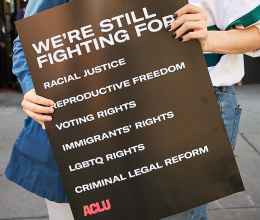
A version of this post is published in Tampa Bay Times.
Floridians believe in second chances and support criminal justice reform.
For evidence, look at the last election where over 60 percent of voters supported restoring voting rights to returning citizens after they complete their sentence, excluding those convicted of murder and felony sexual offense.
More than 60 percent of Floridians also supported changing the state constitution to allow criminal justice sentencing reforms to be applied to people currently incarcerated, not just those sentenced in the future.
Polls conducted by conservative and progressive pollsters have shown a clear majority of voters support common-sense reforms like providing non-violent drug offenders with substance abuse treatment, instead of multi-year or multi-decade prison sentences, and increasing mental health services, educational programming, and vocational training to ensure that individuals are able to successfully reintegrate in their communities and become productive citizens once released from prison.
In addition to the statistical evidence, I see in my daily life that Floridians of all ages, races, religions, genders, and geographies support second chances and the basic principles that seem to have been lost on our legislators. For example, possession of one ounce of marijuana should not result in up to five years in prison, and Black people should not get longer sentences than white people who commit the same offense in the same city with similar criminal records.
As I meet with directly impacted people, law enforcement officials, faith and business leaders across the state, most agree that incarcerated Floridians should be able to reduce their sentences through good behavior, completion of education or job training courses, or by performing an outstanding deed, such as saving a life of a fellow inmate or guard. Everyone seems to agree that we need to expand these rehabilitative opportunities and reward participation so that individuals will be better able to be productive citizens once released. However, Florida Statutes currently arbitrarily place a 15-percent limit on the amount of time one can earn off their sentence for good behavior and engaging in such programming.
The Florida Legislature passed a criminal justice reform package earlier this year that in small ways amended some of the most outdated criminal statutes (e.g., it made it a misdemeanor to steal something over $300, whereas previously it had been a felony; and, made it less burdensome for individuals to obtain some occupational licenses upon release from prison). Some legislators and reporters have called this the “Florida First Step Act,” after the federal First Step Act, passed by Congress and signed by President Donald Trump in December.
But if the goal is to tackle Florida's mass incarceration crisis, equating Florida’s bill with the national measure is a major overstatement. The federal First Step Act freed more than 3,000 from prison and halfway houses across the country. This will result in a one-percent drop in the federal prison population. In addition, the federal First Step Act invests millions of dollars into reentry support, reduces racial disparities among those incarcerated, allows incarcerated people to take more time off their sentence through positive behavior, and expands the types of serious and debilitating illnesses that could allow people to complete their sentences in their communities.
I think it's wrong to call Florida's modest reform by the name of the First Step Act when it invests zero dollars in reentry, gets zero people out of prison, and has no impact on racial disparities that have resulted in a much higher percentage of Black Floridians being incarcerated than white Floridians. It is smart policy to champion reforms that reduce recidivism racial disparities.
Here are three common-sense reforms all Floridians should get behind:
- If incarcerated people earn time off their sentences for good behavior and engaging in rehabilitative programming, let them use it. Don't arbitrarily cap the time a person can use toward their sentence at 15 percent. We should be encouraging, incentivizing, and rewarding good behavior and participation in self-betterment programs, not limiting it.
- Decriminalize possession of small amounts of marijuana. Last year, over 40,000 Floridians - disproportionately young people and people of color - were arrested for possessing less than one ounce of marijuana.
- Ensure that individuals that are arrested are not locked up in jail pre-trial simply because they can’t afford bail. It is unjust and inhumane to keep people who are not a flight risk and do not pose a risk of physical harm to others separated from their families, their jobs, and their communities simply because they don’t have enough money to post bail.
In addition, Florida often sentences people to life in prison, even though their offenses did not cause loss of life or even injury to victims. Sentencing individuals to decades of prison when no one was physically harmed, with no chance of release through rehabilitation, will cost hundreds of thousands of dollars per inmate and is simply wrong. That needs to change.
These reforms — and other common-sense fixes — have been successfully implemented in other states. By following their example, members of the Florida Legislature and the governor could help end the state’s mass incarceration crisis.







